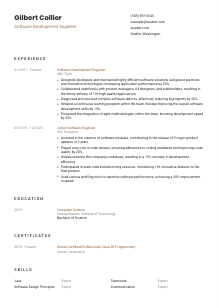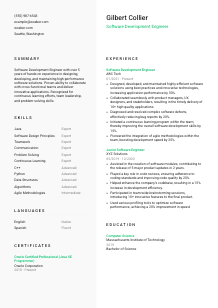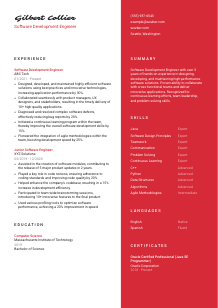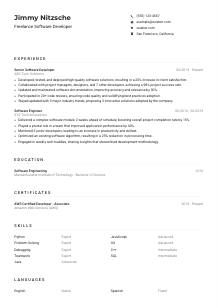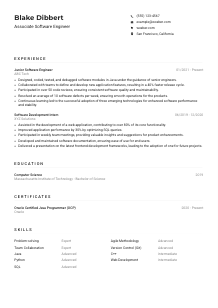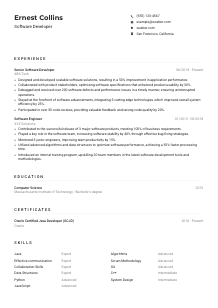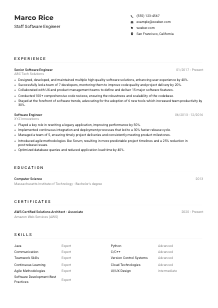Software Development Engineer Resume Example
Crafting code, but your resume doesn't compute? Delve into this Software Development Engineer resume example, optimized using Wozber free resume builder. See how to blend your programming prowess with job prerequisites, so your career trajectory is as energetic as a high-speed algorithm!
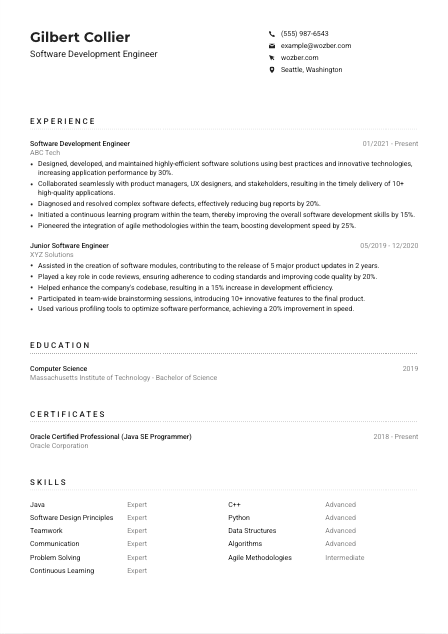
How to write a Software Development Engineer resume?
Greetings, future Software Development Engineer trailblazer! In the dynamic realm of software engineering, standing out is more than a goal—it's imperative. Your resume isn't just a document; it's a powerful narrative of your engineering prowess. Leveraging the Wozber free resume builder, this guide is meticulously crafted to navigate you through the intricacies of aligning your resume with the Software Development Engineer role you aspire to clinch.
Ready to begin this transformation? Let's delve into transforming your resume into an enticing narrative that unequivocally narrates your suitability for a Software Development Engineer role!
Personal Details
The Personal Details section is where you make your first impression. It's where you introduce yourself not just as a candidate, but as the next Software Development Engineer your employer needs. Let's dive into perfecting this section to strike the right chord with potential employers, assuring them you're more than just fit for the role.
1. Boldly Brand Your Name
Your name is your headline. Ensure it grabs attention by opting for a clear, professional font that's slightly larger than the rest of your resume content. This isn't just about aesthetics; it's about establishing your personal brand from the get-go.
2. Job Title Precision
Mirror the job title directly below your name to instantly resonate with the hiring manager. In this context, precisely state "Software Development Engineer" to reflect the sought-after position, creating a direct link between you and the role at first glance.
3. Essential Contact Info
In this digital age, your phone number and a professional email address (think firstname.lastname@email.com) are crucial. An inadvertent typo here can mean a missed connection, so triple-check for accuracy. If you have a LinkedIn profile or a GitHub repository showcasing your projects, adding it here would significantly bolster your credentials.
4. Location Matters
The job requisites a candidate in Seattle, Washington. By already being local or willing to relocate (and stating it here), you're ticking off an essential logistic checkbox for your employer, simplifying their hiring decision.
5. Online Profiles: A Must-Have
For a Software Development Engineer, your GitHub profile or personal portfolio website can be the difference between getting noticed or not. Ensure any platform you list is updated and showcases your projects and contributions, echoing the ingenuity you'll bring to the position.
Takeaway
The Personal Details section is your resume's handshake. Keep it professional, relevant, and align it precisely with the Software Development Engineer role. It's your resume's business card, opening the door to deeper discussions about your career accomplishments and potential.





Experience
Your Experience section is where you shine a spotlight on your journey as a Software Developer. It's your opportunity to narrate your story through your achievements, letting your potential employer see the impact you're poised to make. Let's explore how to curate this section to highlight your journey perfectly.
- Designed, developed, and maintained highly‑efficient software solutions using best practices and innovative technologies, increasing application performance by 30%.
- Collaborated seamlessly with product managers, UX designers, and stakeholders, resulting in the timely delivery of 10+ high‑quality applications.
- Diagnosed and resolved complex software defects, effectively reducing bug reports by 20%.
- Initiated a continuous learning program within the team, thereby improving the overall software development skills by 15%.
- Pioneered the integration of agile methodologies within the team, boosting development speed by 25%.
- Assisted in the creation of software modules, contributing to the release of 5 major product updates in 2 years.
- Played a key role in code reviews, ensuring adherence to coding standards and improving code quality by 20%.
- Helped enhance the company's codebase, resulting in a 15% increase in development efficiency.
- Participated in team‑wide brainstorming sessions, introducing 10+ innovative features to the final product.
- Used various profiling tools to optimize software performance, achieving a 20% improvement in speed.
1. Decipher the Job Description
Begin by deeply analyzing the job description. Highlight keywords and phrases, especially those related to technical skills, programming languages, and soft skills. This ensures your resume speaks the same language as your potential employer's expectations.
2. Chronology with Impact
Structure your experiences from the most recent, detailing roles, companies, and dates. For each position, focus on accomplishments that align with the Software Development Engineer role—think projects you've spearheaded, technologies you've mastered, and the tangible impacts of your contributions.
3. Accomplishments That Resonate
For each role, draft accomplishment statements that mirror the job requirements. Use action verbs to describe your contributions and quantify your achievements where possible—be it enhancing application performance, reducing bug reports, or accelerating development timelines.
4. Quantify Your Success
Quantification makes your contributions tangible. Increased application performance by 30%? Reduced bug reports by 20%? These figures paint a clear picture of your impact, making your resume stand out.
5. Relevance is Key
Your dedication as a member of the engineering team may have extended beyond software development duties, but focus on the experiences directly relevant to the job you're applying for. Ensure every point highlights skillsets and achievements that directly align with a Software Development Engineer's expected roles.
Takeaway
Meticulously curating your experience section is akin to laying down the foundation of your professional narrative. Each statement you make is a testament to your capability and potential as a Software Development Engineer. Emphasize accomplishments that resonate with the role's requirements, making it impossible for hiring managers to overlook your candidacy.
Education
The Education section is not just a list of qualifications; it's a testament of your foundational understanding and dedication to the field of software development. Let's navigate through structuring this section to elevate your resume.
1. Highlight the Essentials
Clearly list your degree, emphasizing fields directly relevant to the Software Development Engineer role. For instance, a Bachelor's degree in Computer Science is not just a condition met, but a solid foundation that aligns with the expertise required for the role.
2. The Power of Clarity
Maintain clarity and conciseness—list your degree, the institution, and your graduation date. This structured format allows a hiring manager to quickly ascertain your academic credentials without sifting through unnecessary information.
3. Degree Specification
If your degree directly matches the job requirement (as 'Bachelor of Science in Computer Science' does), prominently feature it on your resume. This alignment reaffirms your academic preparation for the technological demands of the role.
4. Coursework and Projects
In instances where your educational background is particularly relevant to the job's demands, consider listing significant courses or projects. This could be especially compelling for recent graduates, illustrating predictive capabilities and readiness.
5. Additional Educational Achievements
While maintaining focus on relevancy, don't shy away from listing honors, awards, or extracurricular activities that underscore your commitment and passion for software development. These can differentiate you, revealing a well-rounded candidate.
Takeaway
Your education section reinforces your technical foundation and shows your dedication to the field. Craft it in a way that it aligns seamlessly with the Software Development Engineer role, making it another convincing chapter in your professional narrative.
Certificates
In the fast-paced world of software engineering, certifications are concrete evidence of your commitment to continuous learning and expertise in specific areas. Let's explore how to feature these in your resume to illuminate the breadth of your knowledge and passion for the field.
1. Job Requirements First
First, review the job description for any explicit certification requirements. While the job description may not specifically demand them, certifications such as "Oracle Certified Professional (Java SE Programmer)" elevate your resume by demonstrating your initiative and specialized skills.
2. Select Certifications Wisely
Prioritize certifications that are directly relevant to the job role. Displaying certifications that showcase your mastery of specific languages (like Java, C++, or Python) or methodologies relevant to the Software Development Engineer position underscores your suitability and drive.
3. Timeliness and Relevance
For certifications with expiration dates or those that are particularly recent, listing the date acquired or the validity period showcases your up-to-date expertise, a crucial aspect in a constantly evolving field like software engineering.
4. Continuous Learning
In a field that's as dynamic as software engineering, staying updated isn't just an option—it's a necessity. Regularly updating your certifications and pursuing new ones reflects an unyielding commitment to growing your professional toolkit.
Takeaway
Your commitment to professional development via certifications is a strong endorsement of your capabilities. In the narrative of your resume, they act as highlights—underscoring your skills, dedication, and readiness to tackle the challenges of a Software Development Engineer role head-on.
Skills
In the realm of software development, your skills are your tools of the trade. The Skills section of your resume isn't just a list; it's a curated display of your technical and interpersonal capabilities. Let's delve into tailoring this section to showcase the unique toolkit you bring to a Software Development Engineer role.
1. Extract Relevant Skills
Start by dissecting the job description to identify both stated and implied skills required for the role. Your expertise in programming languages like Java, C++, or Python, your understanding of software design principles, and your proficiency with data structures and algorithms are just the beginning. Include both your hard technical skills and soft skills like teamwork and communication to present a holistic view of your capabilities.
2. Illustrate Alignment
Directly align your skills with those mentioned in the job description. Lead with your technical skills but don't overlook the power of soft skills. The ability to collaborate with cross-functional teams, as emphasized in the job description, is as critical as your coding prowess. Highlighting these skills asserts your compatibility with the role's requirements.
3. Precision and Brevity
While it might be tempting to list every skill you've ever acquired, focus on the ones most pertinent to the job at hand. This not only makes your resume more ATS-friendly by matching keywords but also ensures that the hiring manager sees the most relevant information without unnecessary clutter.
Takeaway
Your skills section is a powerful testament to your ability to fulfill the demands of a Software Development Engineer role. Approach it as a showcase of your most impressive tools, both technical and interpersonal. Be precise, be relevant, and most importantly, ensure it is in harmonious alignment with the role you're aspiring to secure.
Languages
In our interconnected world, the ability to communicate across languages can significantly amplify your appeal as a candidate. This is particularly true in multicultural teams or global companies. Let's unpack how to effectively present your linguistic abilities in a way that complements your professional qualifications.
1. Align with Job Necessities
Start by evaluating the job description for any language requirements. For a Software Development Engineer, proficient English is crucial, especially for documentation and team communication. Ensure English is prominently listed as a language skill to match this essential requirement.
2. Prioritize and Highlight
If additional languages are part of your skill set, list them in order of proficiency. This can demonstrate your versatility and ability to adapt in a global work environment, potentially giving you an edge in the selection process.
3. Accuracy in Proficiency
Be honest and precise about your language proficiency levels—whether native, fluent, intermediate, or basic. This clarity helps set realistic expectations and showcases your integrity.
4. Role Relevance
Consider the scope of the role and the company's footprint. If the position implies interaction with regional offices or clients in non-English speaking countries, highlighting relevant language skills could present you as a more compelling candidate.
5. Embrace Your Multilingual Advantage
Your ability to navigate multiple languages is not just a skill; it's a bridge to broader understanding and collaboration. Even if proficiency in languages other than English isn't a job requirement, it speaks to your adaptability and cultural awareness—attributes highly valued in today's global workforce.
Takeaway
Your proficiency in multiple languages is a reflection of your ability to thrive in diverse environments and connect across cultures. In the narrative of your resume, it enriches your professional profile, making you a more attractive and versatile candidate for the Software Development Engineer role.
Summary
The summary section of your resume is akin to a personal elevator pitch. It's your chance to capture the essence of your professional journey and aspirations in just a few lines. Let's craft a summary that encapsulates your unique qualifications for a Software Development Engineer role.
1. Grasp the Role's Core
Begin by internalizing the essence of the Software Development Engineer role as depicted in the job description. This understanding forms the foundation of your summary, allowing you to weave in elements that resonate with what employers are seeking.
2. Introduce Your Professional Self
Kickstart your summary with a strong statement about your professional identity. For example: 'Dedicated Software Development Engineer with over 5 years of hands-on experience in developing high-performance software solutions.' This immediately distinguishes you and sets the stage for what follows.
3. Tailor Your Expertise
Highlight your technical proficiencies and project experiences that directly align with the job description. Mention your proficiency in modern programming languages, your understanding of software design principles, and your ability to collaborate with cross-functional teams. This tailored approach illustrates your suitability for the role right off the bat.
4. Conciseness is Key
While it might be tempting to delve into the specifics of your achievements, remember, the summary is a teaser, not the full story. Aim to encapsulate your professional identity and key qualifications in 3-5 compelling lines that inspire the hiring manager to continue reading your resume.
Takeaway
Your summary is your opening narrative. It has the power to immediately engage the hiring manager by showcasing your direct alignment with the Software Development Engineer role. Craft it with care, highlighting your unique skills and experiences, and let it serve as the compelling introduction to the detailed story that unfolds in your resume.
Launching Your Software Development Engineer Career Path
Congratulations on completing this journey through tailoring your resume to the Software Development Engineer role! Armed with these insights, you are now poised to refine your resume not just to meet expectations but to exceed them spectacularly. Remember, your resume is the narrative of your professional journey. Fine-tune it, invest it with your unique signature, and allow it to be your beacon, guiding you to your next significant opportunity.
The tech world is eager for your contribution. It's time to shine!

- Bachelor's degree in Computer Science, Engineering, or a related field.
- Minimum of 3 years of professional experience in software development.
- Proficiency in at least one modern programming language such as Java, C++, or Python.
- Deep understanding of software design principles, data structures, and algorithms.
- Strong communication and teamwork skills to collaborate with cross-functional teams.
- The ability to write effectively in English is necessary.
- Must be located in or willing to relocate to Seattle, Washington.
- Design, develop, and maintain software solutions using best practices and the latest technologies.
- Collaborate with product managers, UX designers, and other stakeholders to ensure the delivery of high-quality applications.
- Debug and resolve software defects and perform root cause analysis.
- Continuously learn and improve software development skills while staying updated with industry trends.
- Contribute to the team's agile processes and methodologies in an innovative and collaborative environment.





